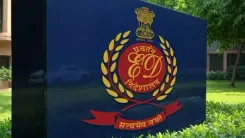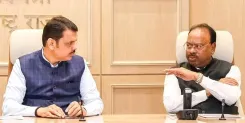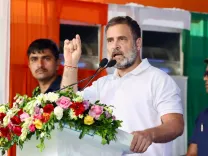What Led to the Busted Illegal Carbocell Mining in Gujarat's Surendranagar?

Synopsis
Key Takeaways
- Significant raid in Surendranagar uncovered illegal carbocell mining.
- Confiscated minerals and equipment worth Rs 55 lakh.
- Carbocell mining poses environmental threats.
- Local authorities face allegations of collusion.
- Call for stricter enforcement of mining regulations.
Surendranagar, July 16 (NationPress) A significant operation by the Surendranagar Mines and Minerals Department in Gujarat revealed extensive illegal mining activities of carbocell near Chorvira village in Sayla taluka. Acting upon credible intelligence, authorities managed to seize minerals and machinery valued at approximately Rs 55 lakh.
Carbocell is a carbonaceous mineral typically located in areas rich in lignite or low-grade coal. In Gujarat, especially in regions like Surendranagar and Bhavnagar, it is found underground and is frequently extracted for use as an alternative fuel in local industries and brick kilns due to its combustibility.
While it may not be classified as premium coal, carbocell possesses commercial viability due to its energy content. However, unchecked and illegal mining operations have resulted in environmental damage, land disputes, and safety hazards.
This operation spanned across nine sites, leading to the confiscation of a dumper, six tractors, 18 spinning wheels and casings, four frames, alongside a substantial amount of carbonaceous minerals. This crackdown represents a pivotal step against unauthorized mineral extraction in the region.
Further updates are anticipated.
In March, Opposition Congress MLA Amit Chavda raised concerns in the Gujarat Assembly, alleging widespread illegal carbocell mining in Surendranagar.
The government defended its stance by highlighting cases filed and wells sealed, yet Chavda insisted that the actual number of illegal leases surpassed 300 in Muli, Than, and Chotila, additionally reporting at least three mining-related fatalities, contrary to official claims of no deaths. He called for more stringent enforcement, asserting that the issue persisted unabated.
In a related development, just last month, the Gujarat Geology Department conducted a substantial raid near Chellowas-Anodiya in Mansa taluka (Sabarmati riverbed) under the supervision of Collector Mehul K. Dave. Officials confiscated sand and soil materials valued at around Rs 1.7 crore, along with heavy machinery such as a stuck dumper and two JCBs. This operation aimed to combat unauthorized sand extraction from riverbeds, although villagers noted that local law enforcement had ignored the activity for an extended period.
Earlier in May, former BJP MP Dipsinh Rathod from Sabarkantha raised alarms about the alarming depletion of up to 75 percent of Sabarmati’s sand due to illegal mining.
He reported that around 25-30 overloaded dumpers operated daily at sites like Waghpur and Piludra. Rathod accused the Gujarat Pollution Control Board and local officials of colluding, suggesting they were informed prior to raids and only carried out 'symbolic' actions—penalizing a few vehicles before declaring operations resolved.







